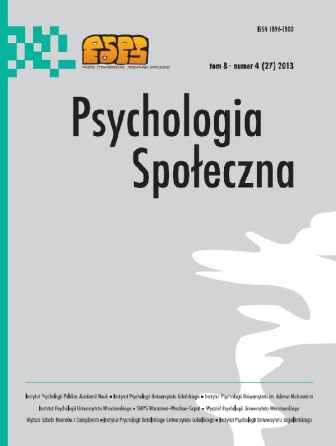Zlozonosc standardow Ja a efektywnosc rozpoznawania tresci utajonych słow o roznych komponentach afektywnych
The Self standards’ complexity and recognition of subliminally exposed words with diverse affective components
Author(s): Natalia Michalak, Kamila Dobrenko, Maria JarymowiczSubject(s): Psychology
Published by: Wydawnictwo Naukowe Scholar Sp. z o.o.
Keywords: implicit cognition and implicit emotions, automatic vs. reflective origin of emotions, cognitive representation of the Self, self-insight
Summary/Abstract: To measure effectiveness of recognition of subliminally (33 ms) exposed words we used as target stimuli their synonyms exposed on the conscious level and paired with new, unrelated words. We predicted that recognition of subliminal words will depend not only on lexical factors but also on personality, i.e., development of representation of the Self. In study 1 we used words related to emotions of different origin: automatic (homeostatic and hedonic) vs. reflective (associated with conceptual, evaluative standards). Data (N = 27) show that task performance was on the random level in the group of participants with relatively low level of complexity of the Self, but it was significantly higher in the group with high level of complexity of the Self. Only in the second group – and exclusively in the case of words related to automatic emotions – there was revealed the valence effect: random level of recognition of negative words and significantly better performance for positive words. In study 2 another list of subliminally exposed words was used, and two dispositional variables were measured: Self standards complexity and lexical ability. Data (N = 86) indicated importance of both dispositional variables – regardless of the valence of implicit words.
Journal: Psychologia Społeczna
- Issue Year: VIII/2013
- Issue No: 27
- Page Range: 448-458
- Page Count: 11
- Language: Polish

